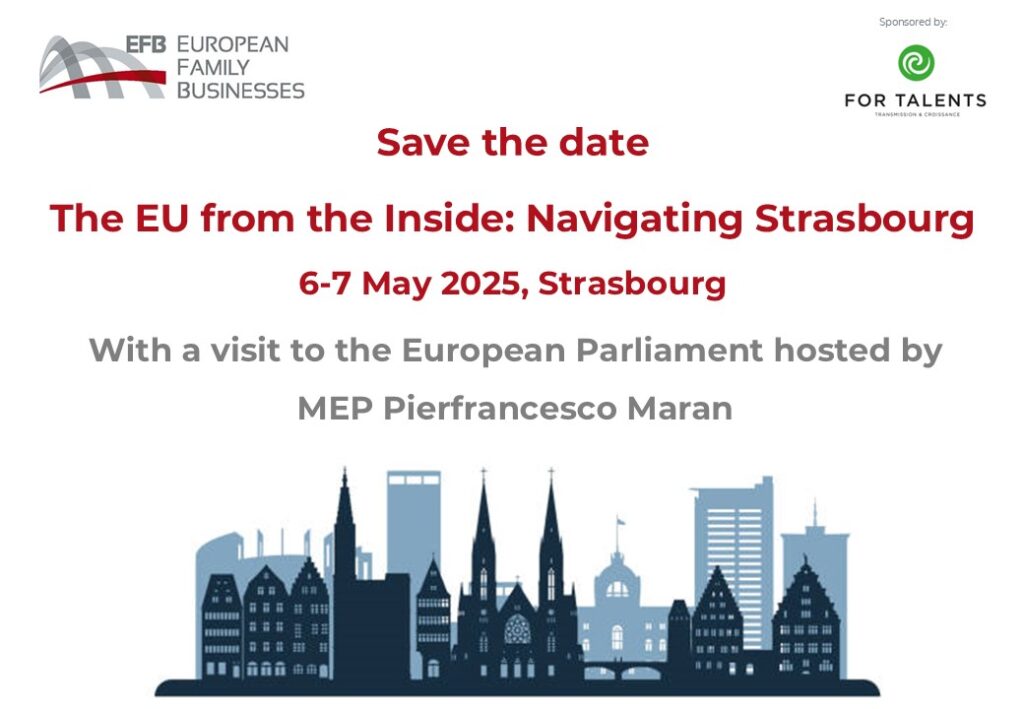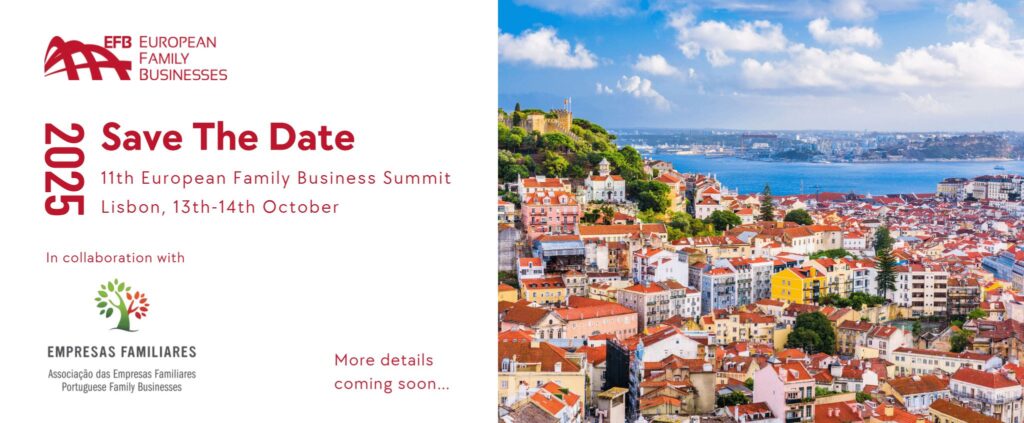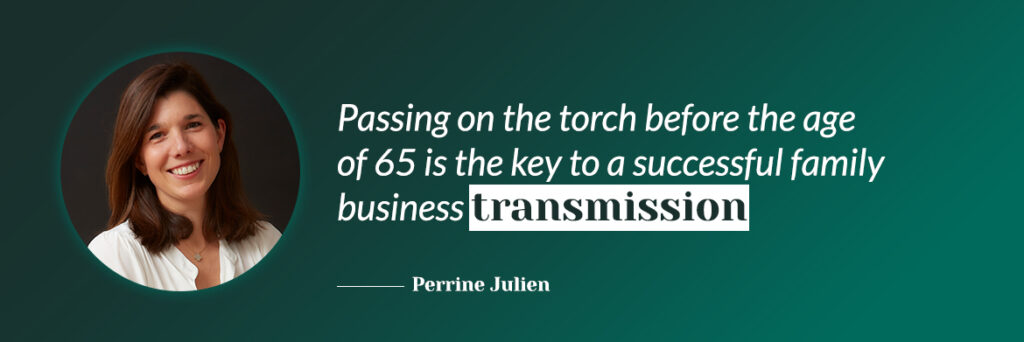European Family Businesses Newsletter # 29
With the beginning of the new year, it is time to reflect on our work during the last six months of 2024.
Recent events and meetings
EFB Welcome Reception
Aimed at spreading awareness of EFB and its work to newly elected and returning MEPs as they settled into the beginning of their mandates, we held a Welcome Reception at the Representation of Baden-Württemberg to the EU in Brussels on the 10th of September.
The event brought together family business owners, policymakers from the EU Commission, in particular the representatives from DG GROW, newly elected and some re-elected MEPs along with some representatives of other business associations.
We would like to thank the companies of Schwarz Group and the Representation of Baden-Württemberg to the EU in Brussels for facilitating our welcome reception.
To read more about the event, please visit our website here.
10th Family Business Summit
Our 10th Family Business Summit took place in Rome between the 3rd and 5th of October. This event was the first of its kind as, it was the first time we attached an EFB summit to one of our chapter’s national conferences. In conjunction with our Italian chapter AIDAF, we hosted a great event attracting approximately 500 people from around Europe.
The topic was The Power of People. We had several sessions and talks with business owners from different family businesses and different generations, policymakers and academics to tackle the topic. Along with many opportunities to network and exchange ideas, we also had opportunities to visit Italian family businesses, thanks to AIDAF.
Some of our summit’s highlights included: EFB’s President Mr Udo J. Vetter’s opening speech on where family businesses fit in Europe, expressing the importance of family businesses that are all around us, the threats they are facing and the power of people when they come together. He then introduced EFB and its lobbying work in Brussels. Mr Vetter thanked the sponsors of the event For Talents and EY and our Italian chapter AIDAF along with Ms Giovanna Gregori, executive director of AIDAF and Cristina Bombassei, President of AIDAF for enabling us to host this event.
Ms Bombassei, AIDAF’s President, spoke of the reports on European competitiveness and the single market reiterating that ownership matters.
From a discussion on the power of stewardship to a panel on how to balance the Green Deal with industrial competitiveness, the summit gave us an overarching view of how family businesses are operating in the Single Market and the challenges they face in the current complex geopolitical and economic context.
We were fortunate to secure, a keynote speech from Mr Enrico Letta, chair of Jacques Delors Institute, who was in charge of the report on the future of the Single Market. His main message was that we need to tackle the fragmentation within the single market to remain competitive. ” At a national level, too many countries are thinking that they have gain keeping the situation as it is today, without considering that small gains for one country mean a big loss altogether. We pay the price of this big loss. What I wanted to do in this exercise was to send a red alarm. We are lagging. We are too complicated. We are too fragmented. We have to overcome all this disintegration and this fragmentation.” We could not agree more!
Moreover, we also had the pleasure of having a speech by Ms Martina Dlabajová, Member of the European Parliament from 2014-2024. She outlined what Europe looked like following the conclusion of the European Parliamentary elections of June 2024. She also added the importance of SMEs to the European economy and how EFB worked with her during her time at the European Parliament. The combined efforts of EFB and Ms Dlabajová in 2023, enabled her to include business transfers in a key resolution. She highlighted the role of EFB in raising the topic of business transfers as an issue.
We thank AIDAF and our sponsors for facilitating this exceptional event.
If you would like to find out more about our summit, please visit our website here where you can read the full summit summary.
Policy-related events and meetings
EFB attended several policy-related events in the last few months of 2024. Below, you will find a summary of the main meetings and events. It is also important to note that since the College of Commissioners was agreed upon on the 27th of November and officially began its work on the 1st of December, there was a halt in the legislative procedure of the EU Institutions.
Nevertheless, several important events took place during this time to discuss what the priorities in the Commission’s Work Plan for 2025 should be. Many stakeholders, including ourselves, also evaluated what they thought should be worked on as soon as possible in Commission President von Der Leyen’s second mandate.
SME Assembly 2024
Between the 18th and 20th of November 2024 in Budapest, EFB representatives Mr Jesús Casado, EFB’s Secretary General and Ms Joana Peixinho, EFB’s Junior Policy Advisor, attended the SME Envoy Network meeting and the SME Assembly organised by the European Commission.
During the SME Envoy Network meeting, a point on SME policy in Hungary was presented. Here, Mr Casado intervened to ask about the measures planned for business transfers in the foreseeable future. His question raised a vital point: business transfers are critical to European competitiveness and job retention so, how will the topic be approached by the European Commission in the next mandate? How will member states tackle the issue? EFB will continue to call for discussions on business transfers as a priority.
As the assembly began, important recommendations arose on the topics of better regulation and reduction of administrative burden, the need for sustainability – both human and environmental, scaling up, access to finance, highlighting best practices, streamlining the legal framework of public procurement, simplifying the Corporate Sustainability Due Diligence Directive (CSDDD) and Corporate Sustainability Reporting Directive (CSRD).
To read the full summary of the event visit our website here.
Other policy meetings
Between the 20th-22nd of October, EFB’s Secretary General Mr Jesús Casado, attended the national IEF – Instituto de la Empresa Familiar summit in Spain, where he spoke to Former Prime Minister of Italy and author of the Much More than a Market report Mr Enrico Letta. Mr Letta suggested that EFB should encourage its national chapters to communicate with their respective national governments as this helps to implement the recommendations of the report, thus helping family businesses thrive in a less fragmented single market.
On the 23rd of October, Mr Casado had a meeting with Mr Bonifacio García-Porras, Head of Unit for Small and Medium Enterprises to discuss topics vital to the future of companies in Europe.
Ms Joana Peixinho attended three meetings put together by the European Commission’s SME Envoy Network on 1st October, 11th December and 12th December. Here different policy topics were discussed such as: administrative burden, the SME test, public procurement and more.
During a meeting in November with Mr Ben Butters, CEO of EuroChambers, both Mr Butters and Mr Casado exchanged views on what the associations are working on. A discussion on how both EFB and EuroChambers can work together in the foreseeable future on topics of mutual interest was held.
EFB Publications
Small Mid-Caps (SMCs)
In October, we published a paper on Small Mid-Caps (SMCs) following a request from the European Commission’s DG GROW to help determine what we think the category should include. In our view, the SMC definition is part of the larger topic that we have been calling for over the last few years. Namely, a European category for mid-caps.
Background
The Commission included the topic of mid-caps in their 2023 SME Relief Package, which was a very substantial win for us. In Action 18, the Commission noted that they will, “be attentive to the needs of companies that outgrow the thresholds of the SME definition, as well as the broader range of small mid-cap companies…”. The Commission also committed to developing a harmonised definition for SMCs and building a dataset based on the aforementioned definition. We are very happy with the positive steps in the development of a mid-cap definition.
While they are only looking at the small mid-caps for the moment, this gives us the momentum required to push for an entire mid-cap category.
You can read our position on SMCs on our website.
Change course now or face irreversible decline – the family business call for competitiveness.
In December, following the appointment of the new College of Commissioners and ahead of the release of the Commission’s Work Programme, we released a paper that we sent to Commissioners, MEPs and key people in DG GROW calling for action on key issues impacting European competitiveness.
In our document, you will find five overarching pillars that have to be handled as soon as possible:
- Reduction of administrative burden and reporting.
- Re-thinking Europe’s industrial strategy – strengthening Europe’s industrial base, trade agreements, and job preservation.
- Increase investment in Research, Development, and Innovation.
- Closing the skills gap and preparing for the skills shift.
- The need for solid financing.
Please head over to our website for the full document.
Upcoming Events
EFB’s 3rd Next Gen event
We are pleased to announce that our third Next Generation event will take place between the 6th-7th of May 2025 in Strasbourg, France. Under the title of The EU from the Inside: Navigating Strasbourg.
As part of our event, we will have a meeting with MEP Pierfrancesco Maran from the Socialists and Democrats Group at the European Parliament.
We are currently finalising the programme, but please remember that spaces for the event are limited and will be allocated on a first come first serve basis.
More information is coming soon.

11th Family Business Summit
Join us in Lisbon from the 13th-14th of October for our 11th Family Business Summit.
This year’s summit will be held in collaboration with our Portuguese chapter Associação das Empresa Familiares. We look forward to interesting discussions, exchange of ideas, networking opportunities and more.
More information will be coming soon, but for now please save the date!

Sponsors

For Talents has released a new article. Read it in full below.
Family Business Transmission: When is the right time to pass the torch?

The ideal age to transfer a business is around 60-65 years, while the ideal age to take over a business falls between 35 and 45 years.
Withone in four family business leaders over the age of 60 and one in ten over the age of 65, more than half of SMEs and mid-sized companies (Enterprises de Taille Intermédiaire – ETIs) will face a leadership transition in the next decade. Yet, 47% of business owners between 60 and 69 still have no formal transmission plan!
Delaying the transition can put the company’s long-term success at risk. Waiting too long may lead to stagnation, reduced innovation, and strategic misalignment with market trends.
So, when is the right time to hand over the reins? When should the next generation step in? And how can family businesses ensure a smooth, effective transition that respects the company’s legacy while positioning it for future growth?

Plan Ahead: transmission should happen before 65
Experts recommend starting the transmission planning process by the age of 55 and aiming for a transition at around 65. Why? Because postponing leadership change can impact business performance.
Business performance tends to decline after 60. Research from Bocconi University shows that leaders over 70 experience a drop of 1.2 percentage points in return on equity (ROE)** and a 0.9 percentage point slowdown in revenue growth. This suggests that aging leaders tend to be more risk-averse, limiting innovation and agility.
Other studies confirm this trend. McClelland, Barker, and Oh (2011) found that CEOs approaching 65 adopt more conservative strategies, often at the expense of long-term business growth.
The Next Generation should take over between the ages of 35 and 45
For the incoming leader, the ideal age for transmission is typically between 35 and 45. At this stage, they have gained enough professional experience to take on challenges while maintaining the drive and fresh perspective needed to move the company forward.
New leadership brings renewed momentum. A Deloitte Next Generation Family Business study (2016) found that 51% of next-generation leaders plan to take more risks than their predecessors, and 56% intend to reshape the company’s strategy.
The Bocconi study also revealed that younger family business leaders deliver better financial results, achieving +1.4 percentage points in ROE and +1.7 percentage points in revenue growth compared to older executives.
The danger of waiting too long
Postponing the transition too long can have serious consequences:
- The next generation may lose interest or pursue other opportunities.
- A growing disconnect between the founder’s vision and the needs of the business.
- Missed opportunities for innovation and strategic change.
The age of 65 is often seen as ideal because it allows the outgoing leader to transition into a new personal phase while ensuring the business remains dynamic and competitive.
Best Practices for a successful transmission
✓ Ensure the transition happens before the age of 65 to maintain business momentum and leadership effectiveness.
✓Help the outgoing leader transition. A clear plan for life after leadership ensures they step back with confidence, and they truly make space for the next generation.
✓Prepare the next generation gradually. Progressive involvement in decision-making between ages 35 and 45 leads to a smoother transition.
✓ Encourage collaboration with the right mindset. The outgoing leader can remain engaged as an advisor, offering their experience while allowing the successor to implement necessary strategic shifts.
By structuring the transition carefully and proactively, family businesses can ensure a leadership change that preserves the company’s legacy
while positioning it for future success.
Article by Perrine Julien
MANAGER ACCOMPAGNEMENT TRANSMISSION
Sources:
o McClelland, P. L., Barker, V. L., & Oh, W. Y. (2012). CEO career horizon and tenure: Future performance implications under different contingencies. Journal of Business Research, 65(9), 1303-1310.
o Deloitte (2016). Next-generation family businesses: Evolution, keeping family values alive. Deloitte EMEA Family Business Centre.
o Corbetta, G., Quarato, F., & Minichilli, A. (2016). The AUB Observatory Report on Italian Family Firms. Università Bocconi.
o Bpifrance Le Lab (2023). Les entreprises familiales à l’épreuve des générations. Bpifrance Le Lab.
For more information about For Talents visit: https://fortalents.com/

